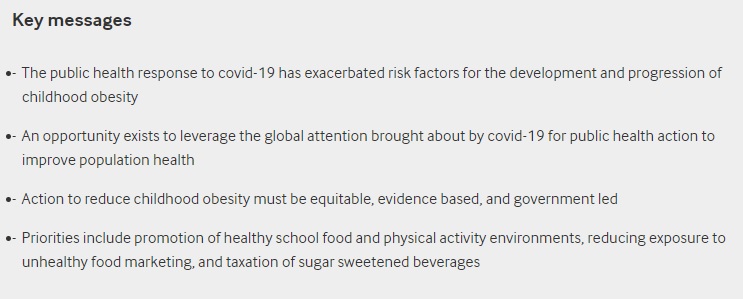BMJ 2021; 374 doi: https://doi.org/10.1136/bmj.n1716 (Published 10 August 2021) BMJ 2021;374:n1716
Alexandra Chung and colleagues call for governments to prioritise child obesity as they implement measures to recover from the pandemic

Extract
Healthy school food and physical activity environments
As part of government efforts to reduce the spread of covid-19, schools and early childhood education and care settings have sometimes been closed for long periods. More than one year into the pandemic, school closures continue for millions of children worldwide.11 As a consequence, many schools have turned to home learning, with reduced opportunities for physical activity and a reliance on screens for education and communication.121314 Excess sedentary time and inadequate physical activity are known risk factors for the development of childhood obesity.
Recognising that covid-19 restrictions differ between countries and have been periodically lifted and reinstated, early childhood and school settings have a dual role: to help children to eat well and be physically active at home; and as children return to campus, provide nutritious food and drinks and physical education curriculums. Read more at https://www.bmj.com/content/374/bmj.n1716
Conclusion
The covid-19 pandemic has shown that governments can act swiftly to protect health and healthcare services. Leaders worldwide have gone to unprecedented lengths in the interest of public health during the covid-19 crisis, restricting societies in ways never witnessed by this generation. As a result, risk factors for the development and progression of childhood obesity have been exacerbated. As societies build back from covid-19, it is time to focus on childhood obesity risk factors amplified by the response, and to leverage growing support for public health action to promote population health. Priorities for action include promoting healthy school food and physical activity environments; reducing children’s exposure to unhealthy food marketing; and imposing taxes on sugar sweetened beverages. These actions are successful, cost effective, can improve health equity, and contribute to a comprehensive approach to prevention of childhood obesity. The covid-19 pandemic presents an opportunity for governments worldwide to prioritise action as we rebuild economies and public health systems to deal with the problem of childhood obesity effectively and equitably.
